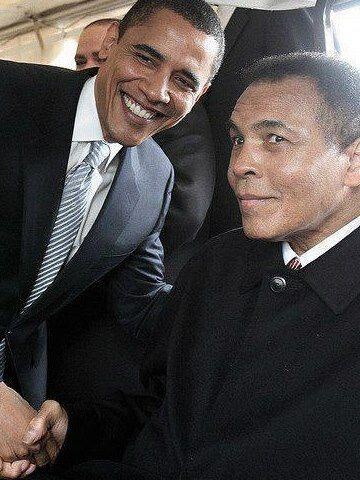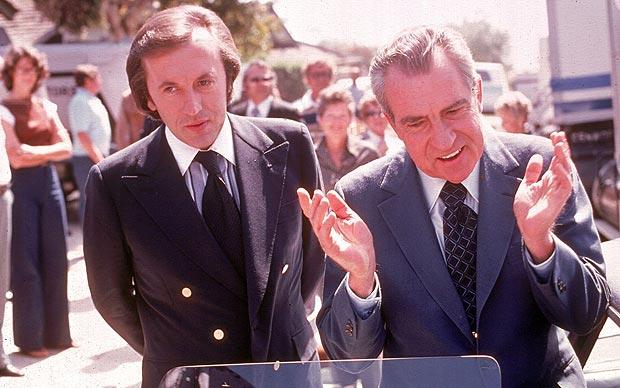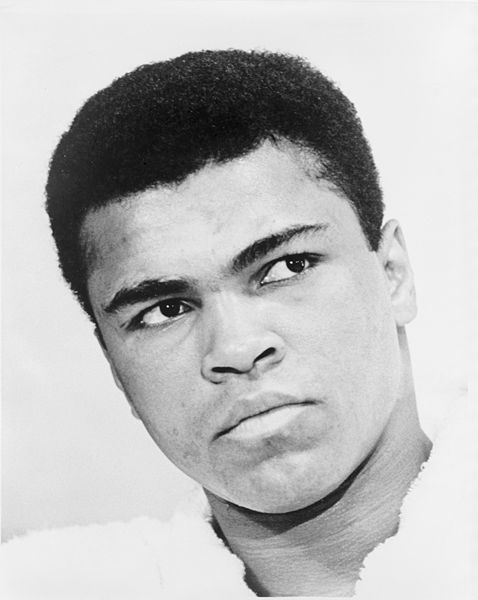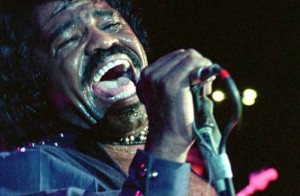Allen Funt meets Muhammad Ali on Candid Camera.
You are currently browsing articles tagged Muhammad Ali.
Tags: Allen Funt, Muhammad Ali
Muhammad Ali sassing Dick Cavett in a boxing gym, 1973.
More Muhammad Ali posts:
Tags: Dick Cavett, Muhammad Ali
In Nick Tosches great book, The Devil and Sonny Liston, the author identifies his subject’s main problem: “In the Saturday night cigarette smokehouse neon dark of that dive, Charles Liston, who neither knew his age nor felt any ties of blood upon this earth nor saw any future beyond the drink in front of him and the smoky dark spare refuge of this barroom from the bone-cutting, river-heavy dank and freezing chill, knew only that he was nobody and that he had come from nowhere and that he was nowhere. He did not see that one could be nobody with a capital ‘N.’” Smokin’ Joe Frazier, who just passed away, and his two greatest opponents, Muhammad Ali and George Foreman, became not just important nobodies but cultural kings.
Frazier, who could barely get a word in, with Ali and Dick Cavett:
Tags: Dick Cavett, George Foreman, Joe Frazier, Muhammad Ali
David Frost interviews Muhammad Ali in 1974. Three years later the world was surprised when Frost whipped Nixon’s behind.
Tags: David Frost, Muhammad Ali
From a 1969 Life piece about the interlocutor Oriana Fallaci, who recalls introducing a young Muhammad Ali to her aggressive interviewing style:
“Question:
Has anyone actually threatened to break your nose off for something you wrote?
Oriana Fallaci:
Something like it happened with Cassius Clay. I had seen him a couple of times, and I went back to his house in Miami to finish the interview. He was eating a melon. I said, Good Morning, Mr. Clay. He keeps on eating the melon and suddenly belches very loud. I think he is just being impolite and I sit down with my tape recorder. And then oooaaagh. He belches again. A big one. Well, I said, let’s go on anyway. And just at that moment, buurp, buurp, whoops, whoops. I turned to him and shouted, I am not going to stay with an animal like you. And I was undoing my recorder, when he took the microphone and threw it against the wall. My microphone! I saw it flying past my head and I took my fists and bam, bam. Went against him. He stood there. So enormous. So tall. And he watched me in a way an elephant watches a mosquito. Black Muslims suddenly came out of all the doors into the room. Evil. Evil. They began to chant. You came for evil. It was like a nightmare. I backed out to my cab, trying to keep my dignity, but really afraid, and went straight to the airport. After the interview was published, Cassius Clay said he was going to break my nose if he ever saw me again. I said, we’ll see, if he breaks my nose, he is going to jail and we will have beautiful news in the papers. I saw him later in New York. I passed with my nose in the air, and he went by without looking at me.”
Tags: Cassius Clay, Muhammad Ali, Oriana Fallaci
This week marks the 50th anniversary of Wide World of Sports, ABC’s great anthology program that introduced closed-in Cold War Americans to cities around the world, from Moscow to Monte Carlo, and made Muhammad Ali and Evel Knievel even bigger stars. And where else could you see frog jumping and drag racing and wrist wrestling in the same 90-minute span?
From ABC’s anniversary program in 1978:
“Spanning the globe to bring you the constant variety of sport… the thrill of victory… and the agony of defeat… the human drama of athletic competition… This is ABC’s Wide World of Sports!”
Tags: Evel Knievel, Muhammad Ali
During his suspension from boxing for refusing to fight in the Vietnam War, Muhammad Ali appeared on a 1968 episode of William F. Buckley’s Firing Line program to discuss a myriad of issues. In the same year, Pete Hamill wrote an article about Ali’s embattled status for Life. An excerpt:
“Even before he exhausted all legal means of defense on his conviction as a draft evader, his title and livelihood were taken away. And yet Ali does not seem bitter. ‘I’m happy,’ he had said on his way to the theater, ’cause I’m free. I’ve made the stand all black people will have to make sooner or later: whether or not they can stand up to the master.'”
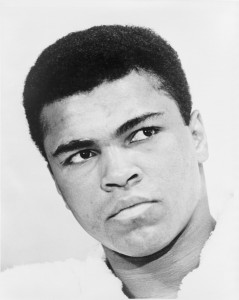
"They say I'm the fastest heavyweight in the ring today. That comes from punching underwater." (Image courtesy of Ira Rosenberg.)
I heard years ago that the young Muhammad Ali made up a bogus story about training underwater for a boxing match in order to get his face in Life magazine. The man was always very gifted when it came to hoopla. I came across the 1960 article, “A Wet Way to Train for a Fight,” on Google Books. Even a quick look at the spread will make it clear why a photo mag was a patsy for such a visual story. Ali hadn’t yet converted to Islam and was still called Cassius Clay. An excerpt from the article:
“The boxer punching up a storm with underwater lefts and rights is as cocky as he is unconventional. ‘Not to be bragging or anything like that,’ says the 19-year-old Cassius Marcellus Clay, ‘but they say I’m the fastest heavyweight in the ring today. That comes from punching underwater.’ Taking a cue from the immortal Ty Cobb, who weighted his shoes in training so that he would feel feather-footed when the season started, Clay goes into a swimming pool and, as these underwater pictures show, does a stunt of submarine shadowboxing. ‘You try to box hard,’ he explains. ‘Then when you punch the same way out of water you get speed. Clay, an Olympic champion before turning pro and winning his first eight fights, has been criticized for talking too much about everything including about how he will win the first world heavyweight title. His answer is to keep on talking–until he gets under water and just makes bubbles.”
Tags: Cassius Clay, Muhammad Ali
A perfect complement to Leon Gast’s great boxing documentary, When We Were Kings, Soul Power chronicles the titanic 1974 fight’s companion music festival in Zaire, which coupled great African musicians with excellent African-American artists. Director Jeffrey Levy-Hinte tries to make some hay from the behind-the-scenes drama that occurs when the prizefight is delayed and the concert is briefly imperiled, but name me a huge music fest from that era that didn’t have logistical problems (Isle of Wight) or far worse (Altamont). The real story here is the performances (a pensive Bill Withers, an expansive Miriam Makeba, the ever-professional Spinners) and the racial pride that fueled the performances. The biggest stars of all, as expected, are Muhammad Ali on the microphone and James Brown on stage, both still in their primes. When Ali delivers his sermons on race in America and James Brown does his splits, Soul Power is powerful excitement.
Tags: Bill Withers, George Foreman, James Brown, Jeffrey Levy-Hinte, Leon Gast, Miriam Makeba, Muhammad Ali, The Spinners

